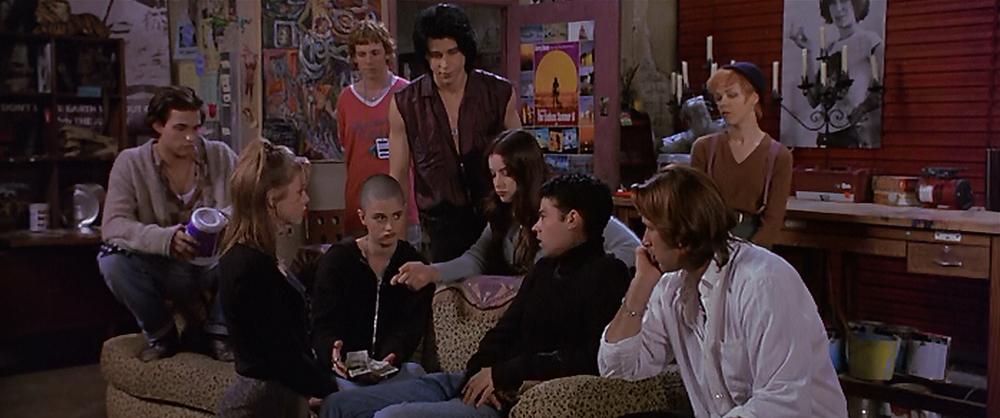
Madhouse of Wax
I don't believe in guilty pleasures. If a movie makes you feel happy, sad, nostalgic, whatever, you should stand by it--even if (especially if) uppity film critics say otherwise. The key to embracing such films lies in acknowledging the reasons you feel guilty enjoying them. For example, I liked Hannah Montana: The Movie, and have recommended it highly to friends. But I can't defend it as anything more than a glitter-sprinkled, trashy distraction.
Were I to praise Miley Cyrus' gaudy, split-personality musical as a misunderstood comment on tween identity crises in post-9/11 America, you'd be right in calling me out. The film is universally recognized as being terrible, but bad movies often make the best viewing experiences. That's an important distinction.*
There are exceptions to every rule, of course; for me, one of the biggest is Empire Records. Alan Moyle's notorious 1995 flop sold more soundtracks than tickets, but has become one of my favorite films of all time.** Unfortunately, I've seen it so often that I can't decide whether it's a legitimately good movie or a legitimately bad one. The semi-queasy feeling I get during the montages in which earnest teenagers sing directly into the camera or bop while they're cleaning their titular workplace send mixed signals to my brain: are they cute flaws in an otherwise fine film, or clear indicators that there's no depths to which actors will sink to avoid waiting tables?
In case you're unfamiliar with Empire Records (for shame!), the movie opens with Lucas (Rory Cochrane), a nouveau-beatnik teen who learns that his boss' boss is about to sell his beloved, independent record store to a soulless, corporate chain. He steals nine-thousand dollars from the safe and heads to Atlantic City--where it quickly disappears, along with his hopes of making enough cash to stop the sale.
The rest of the film takes place during the next day, which sees Lucas' boss/adoptive father, Joe (Anthony LaPaglia), freaking out over the missing money and keeping the store's owner from calling the police. It's also Rex Manning Day at Empire Records; the former Top 40 crooner (played by Maxwell Caulfield) shows up to sign autographs and ogle the attractive, young staff. Among them is Corey (Liv Tyler), who plans to lose her virginity to Manning, a lifelong crush.
About half a dozen subplots spin out from here, including Lucas' pursuit of a shoplifter, Corey's tense friendship with co-worker/BFF, Gina (Renee Zellweger), and a carton of proverbial, post-suicide-attempt egg shells surrounding troubled punk-chick, Debra (Robin Tunney). Amazingly, Carol Heikkinen's script doesn't feel bloated, and (mostly) avoids slipping into melodrama; Empire Records flows just about perfectly, with hilariously off-the-wall interstitials popping up whenever the story teeters on self-seriousness (such as Manning's amazing, Robert Palmer-inspired music video, and another employee's pot-brownie fantasy involving the band GWAR).
I think modern audiences will find a lot to appreciate here, especially in terms of the cast. Populated largely with then-unknowns, the movie overflows with great character actors. When Corey and Gina have their big, screaming fall-out towards the end, it's easy to see why Zellweger later won an Oscar and Tyler...um, became a supporting fixture in The Lord of the Rings. LaPaglia and Cochrane share an absolutely magnetic chemistry that suggests a rich, quirky history; I would love to have followed their adventures beyond the store's walls.
The best reason to watch Empire Records is to revisit Moyle's ability to perfectly capture anti-authority, teen angst. This isn't a hypocritical riff on my earlier Hannah Montana commentary; I'm being serious. Empire Records feels like a day-job documentary about the high schoolers from the director's previous film, Pump Up the Volume. Unlike many teen-targeted movies, Moyle's tend to focus on the adults' plights as much as the kids'. He presents an odd circle of parents being messed up, dissatisfied, and disillusioned--and therefore unable to give their scared children anything to aspire to once the safety net of high school has been snatched away.
At the end of this movie, the gang of misfits holds an impromptu rock concert to raise cash and save their store. It works, of course, but not in the way you might expect. Joe, the put-upon manager who'd spent the entire film lamenting his dip-shit staff and clinging to his semi-corporate job, finds the courage to walk away. In this beautiful moment (set to Sponge's scorched-Earth anthem, "Plowed") an adult remembers what it was like to be young and afraid--but not so afraid as to avoid taking risks.
In this way, Empire Records does its job perfectly: it's unabashedly corny, stupid, and weird, but so was everyone, at some point in their lives. Some are fortunate and/or driven enough to stay that way. But for many of us, careers, family, and mortgages polluted the waters with a new set of standards and satisfactions; they're nice, in the abstract, but nowhere near as pure as the impulses that might once have compelled us to dance in the workplace.
As a teenager, I thought that working at Empire Records would be a sweet gig. As an adult, I just think how miserable it must be to shop there, with half the staff breaking out into Glee-style grunge numbers or screwing in the safe room, and the other holding mock funerals and gluing quarters to the floor.
Empire Records does make me feel guilty--not for loving it, but for having grown up.
*Ironically, movies that probably should inspire guilty feelings are often the most confoundingly popular. Bridesmaids is a terrible film that has fooled a lot of people into thinking that it's not only a quality comedy, but also an Oscar-worthy one.
**Don't be alarmed: it's somewhere in the mid-200s.

